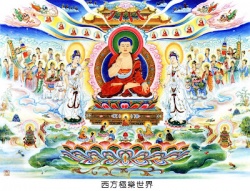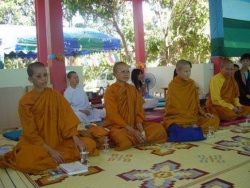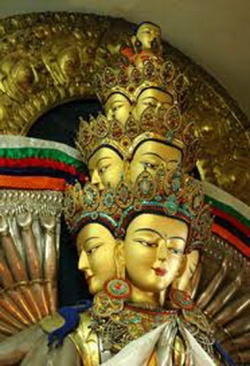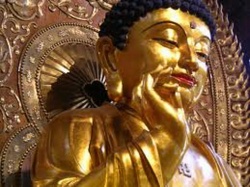Difference between revisions of "The Heart of Prajnaparamita Sutra"
(Created page with "thumb|250px| <poem> Avalokiteshvara, the Bodhisattva of Compassion, meditating deeply on Perfection of Wisdom, saw clearly that the f...") |
|||
| (5 intermediate revisions by 4 users not shown) | |||
| Line 1: | Line 1: | ||
[[File:Hsi+Fang.jpg|thumb|250px|]] | [[File:Hsi+Fang.jpg|thumb|250px|]] | ||
| + | |||
| + | |||
| + | |||
| + | |||
| + | |||
| + | |||
| + | |||
| + | |||
| + | |||
| + | |||
<poem> | <poem> | ||
| − | [[Avalokiteshvara]], the [[Bodhisattva]] of [[Compassion]], [[meditating]] deeply on Perfection of [[Wisdom]], saw clearly that the five aspects of human existence are empty*, and so released himself from [[suffering]]. Answering the [[monk]] [[Sariputra]], he said this: | + | [[Avalokiteshvara]], the [[Bodhisattva]] of [[Compassion]], [[meditating]] deeply on [[Perfection]] of [[Wisdom]], saw clearly that the five aspects of [[human existence]] are [[empty]]*, and so released himself from [[suffering]]. Answering the [[monk]] [[Sariputra]], he said this: |
| − | [[Body]] is nothing more than [[emptiness]], | + | [[Body]] is [[nothing]] more than [[emptiness]], |
| − | [[emptiness]] is nothing more than [[body]]. | + | [[emptiness]] is [[nothing]] more than [[body]]. |
| − | The [[body]] is exactly empty, | + | The [[body]] is exactly [[empty]], |
and [[emptiness]] is exactly [[body]]. | and [[emptiness]] is exactly [[body]]. | ||
| − | The other four aspects of human existence -- | + | The other four aspects of [[human existence]] -- |
[[feeling]], [[thought]], will, and [[consciousness]] -- | [[feeling]], [[thought]], will, and [[consciousness]] -- | ||
| − | are likewise nothing more than [[emptiness]], | + | are likewise [[nothing]] more than [[emptiness]], |
| − | and [[emptiness]] nothing more than they. | + | and [[emptiness]] [[nothing]] more than they. |
| − | All things are empty: | + | All things are [[empty]]: |
| − | Nothing is born, nothing dies, | + | [[Nothing]] is born, [[nothing]] [[dies]], |
| − | nothing is pure, nothing is stained, | + | [[nothing]] is [[pure]], [[nothing]] is stained, |
| − | nothing increases and nothing decreases. | + | [[nothing]] increases and [[nothing]] {{Wiki|decreases}}. |
[[File:Hua-hin 9.jpg|thumb|250px|]] | [[File:Hua-hin 9.jpg|thumb|250px|]] | ||
So, in [[emptiness]], there is no [[body]], | So, in [[emptiness]], there is no [[body]], | ||
no [[feeling]], no [[thought]], | no [[feeling]], no [[thought]], | ||
no will, no [[consciousness]]. | no will, no [[consciousness]]. | ||
| − | There are no eyes, no ears, | + | There are no [[eyes]], no [[ears]], |
| − | no nose, no tongue, | + | no {{Wiki|nose}}, no {{Wiki|tongue}}, |
no [[body]], no [[mind]]. | no [[body]], no [[mind]]. | ||
| − | There is no seeing, no hearing, | + | There is no [[seeing]], no hearing, |
| − | no smelling, no tasting, | + | no [[smelling]], no [[tasting]], |
| − | no touching, no imagining. | + | no [[touching]], no [[Wikipedia:Imagination|imagining]]. |
| − | There is nothing seen, nor heard, | + | There is [[nothing]] seen, nor heard, |
nor smelled, nor tasted, | nor smelled, nor tasted, | ||
| − | nor touched, nor imagined. | + | nor touched, nor [[imagined]]. |
[[File:Ima-47-8.jpg|thumb|250px|]] | [[File:Ima-47-8.jpg|thumb|250px|]] | ||
There is no [[ignorance]], | There is no [[ignorance]], | ||
and no end to [[ignorance]]. | and no end to [[ignorance]]. | ||
| − | There is no old age and [[death]], | + | There is no [[old age]] and [[death]], |
| − | and no end to old age and [[death]]. | + | and no end to [[old age]] and [[death]]. |
| − | There is no [[suffering]], no cause of [[suffering]], | + | There is no [[suffering]], no [[cause]] of [[suffering]], |
| − | no end to suffering, no path to follow. | + | no end to [[suffering]], no [[path]] to follow. |
| − | There is no attainment of [[wisdom]], | + | There is no [[attainment]] of [[wisdom]], |
and no [[wisdom]] to attain. | and no [[wisdom]] to attain. | ||
| − | The [[Bodhisattvas]] rely on the Perfection of [[Wisdom]], | + | The [[Bodhisattvas]] rely on the [[Perfection]] of [[Wisdom]], |
| − | and so with no delusions, | + | and so with no [[delusions]], |
| − | they feel no fear, | + | they [[feel]] no {{Wiki|fear}}, |
and have [[Nirvana]] here and now. | and have [[Nirvana]] here and now. | ||
All the [[Buddhas]], | All the [[Buddhas]], | ||
| − | past, present, and future, | + | {{Wiki|past}}, {{Wiki|present}}, and {{Wiki|future}}, |
| − | rely on the Perfection of [[Wisdom]], | + | rely on the [[Perfection]] of [[Wisdom]], |
| − | and live in full [[enlightenment]]. | + | and [[live]] in full [[enlightenment]]. |
[[File:Imaadd.jpg|thumb|250px|]] | [[File:Imaadd.jpg|thumb|250px|]] | ||
| − | The Perfection of [[Wisdom]] is the greatest [[mantra]]. | + | The [[Perfection]] of [[Wisdom]] is the greatest [[mantra]]. |
It is the clearest [[mantra]], | It is the clearest [[mantra]], | ||
| − | the highest [[mantra]], | + | the [[highest]] [[mantra]], |
the [[mantra]] that removes all [[suffering]]. | the [[mantra]] that removes all [[suffering]]. | ||
| − | This is truth that cannot be doubted. | + | This is [[truth]] that cannot be doubted. |
Say it so: | Say it so: | ||
| Line 62: | Line 72: | ||
'''paragaté''', | '''paragaté''', | ||
'''parasamgaté'''. | '''parasamgaté'''. | ||
| − | '''Bodhi'''! | + | '''[[Bodhi]]'''! |
| − | '''Svaha'''! | + | '''[[Svaha]]'''! |
Which means... | Which means... | ||
| Line 71: | Line 81: | ||
gone over, | gone over, | ||
gone fully over. | gone fully over. | ||
| − | Awakened! | + | [[Awakened]]! |
So be it! | So be it! | ||
| − | * [[Emptiness]] is the usual translation for the [[Buddhist]] term [[Sunyata]] (or [[Shunyata]]). It refers to the fact that no thing -- including human existence -- has ultimate substantiality, which in turn means that no thing is permanent and no thing is totally independent of everything else. In other words, everything in this world is interconnected and in constant flux. A deep appreciation of this idea of emptiness thus saves us from the suffering caused by our egos, our attachments, and our resistance to change and loss. | + | * [[Emptiness]] is the usual translation for the [[Buddhist]] term [[Sunyata]] (or [[Shunyata]]). It refers to the fact that no thing -- [[including]] [[human existence]] -- has [[ultimate]] substantiality, which in turn means that no thing is [[permanent]] and no thing is totally {{Wiki|independent}} of everything else. In other words, everything in this [[world]] is interconnected and in [[constant]] flux. A deep [[appreciation]] of this [[idea]] of [[emptiness]] thus saves us from the [[suffering]] [[caused]] by our [[egos]], our [[attachments]], and our resistance to change and loss. |
| − | Note: Perfection of [[Wisdom]] is a translation of [[Prajnaparamita]]. The full title of this [[sutra]] is The Heart of [[Prajnaparamita]] [[Sutra]]. | + | Note: [[Perfection]] of [[Wisdom]] is a translation of [[Prajnaparamita]]. The full title of this [[sutra]] is The [[Heart]] of [[Prajnaparamita]] [[Sutra]]. |
| − | [This is an interpretation based on many others. All errors are mine alone.] | + | [This is an [[interpretation]] based on many others. All errors are mine alone.] |
</poem> | </poem> | ||
{{R}} | {{R}} | ||
[http://webspace.ship.edu/cgboer/heartsutra.html webspace.ship.edu] | [http://webspace.ship.edu/cgboer/heartsutra.html webspace.ship.edu] | ||
| − | [[Category: | + | |
| + | [[Category:Prajna Paramita]] | ||
Latest revision as of 16:29, 30 January 2024
Avalokiteshvara, the Bodhisattva of Compassion, meditating deeply on Perfection of Wisdom, saw clearly that the five aspects of human existence are empty*, and so released himself from suffering. Answering the monk Sariputra, he said this:
Body is nothing more than emptiness,
emptiness is nothing more than body.
The body is exactly empty,
and emptiness is exactly body.
The other four aspects of human existence --
feeling, thought, will, and consciousness --
are likewise nothing more than emptiness,
and emptiness nothing more than they.
All things are empty:
Nothing is born, nothing dies,
nothing is pure, nothing is stained,
nothing increases and nothing decreases.
So, in emptiness, there is no body,
no feeling, no thought,
no will, no consciousness.
There are no eyes, no ears,
no nose, no tongue,
no body, no mind.
There is no seeing, no hearing,
no smelling, no tasting,
no touching, no imagining.
There is nothing seen, nor heard,
nor smelled, nor tasted,
nor touched, nor imagined.
There is no ignorance,
and no end to ignorance.
There is no old age and death,
and no end to old age and death.
There is no suffering, no cause of suffering,
no end to suffering, no path to follow.
There is no attainment of wisdom,
and no wisdom to attain.
The Bodhisattvas rely on the Perfection of Wisdom,
and so with no delusions,
they feel no fear,
and have Nirvana here and now.
All the Buddhas,
past, present, and future,
rely on the Perfection of Wisdom,
and live in full enlightenment.
The Perfection of Wisdom is the greatest mantra.
It is the clearest mantra,
the highest mantra,
the mantra that removes all suffering.
This is truth that cannot be doubted.
Say it so:
Gaté,
gaté,
paragaté,
parasamgaté.
Bodhi!
Svaha!
Which means...
Gone,
gone,
gone over,
gone fully over.
Awakened!
So be it!
- Emptiness is the usual translation for the Buddhist term Sunyata (or Shunyata). It refers to the fact that no thing -- including human existence -- has ultimate substantiality, which in turn means that no thing is permanent and no thing is totally independent of everything else. In other words, everything in this world is interconnected and in constant flux. A deep appreciation of this idea of emptiness thus saves us from the suffering caused by our egos, our attachments, and our resistance to change and loss.
Note: Perfection of Wisdom is a translation of Prajnaparamita. The full title of this sutra is The Heart of Prajnaparamita Sutra.
[This is an interpretation based on many others. All errors are mine alone.]



